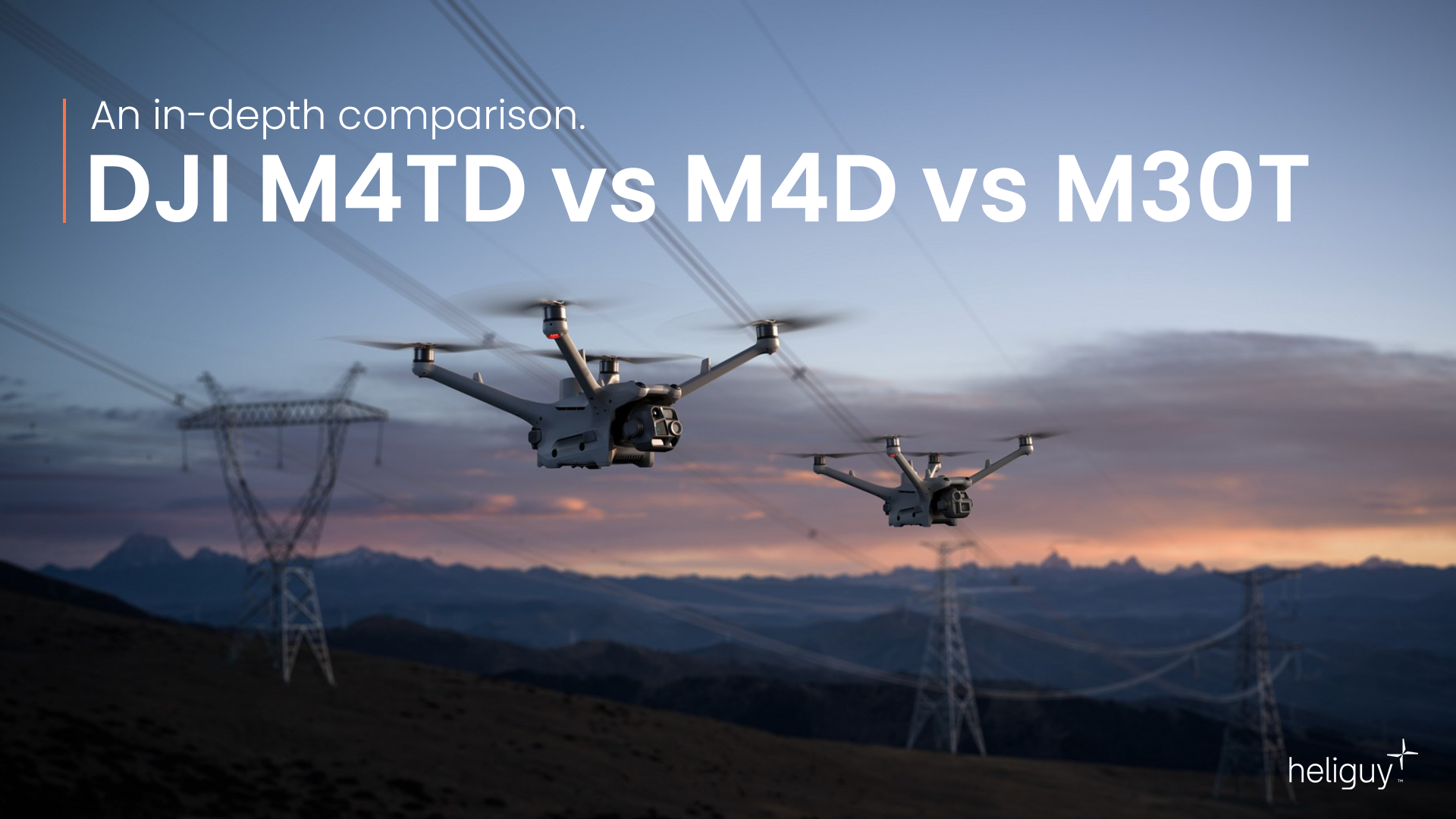
News
Published on 28 Feb 2025
Ian Johnson
DJI M4TD vs M4T vs M30T
heliguy compares the DJI Matrice M4TD, M30T and M4T to assess which DJI thermal drone is best
In-depth comparison between the DJI M4TD, M4T, and DJI M30T;
Find out which portable thermal drone is best for your needs.
From public safety to inspection - thermal drones have become a crucial tool for enterprise organisations.
For a long time, the DJI Matrice 30T has been a stand-out performer, blending power with portability.
But in 2025, DJI has released two platforms with some stellar performance updates to rival the M30T: First with the launch of the Matrice 4T, and then, with the unveiling of the DJI M4TD alongside DJI Dock 3.
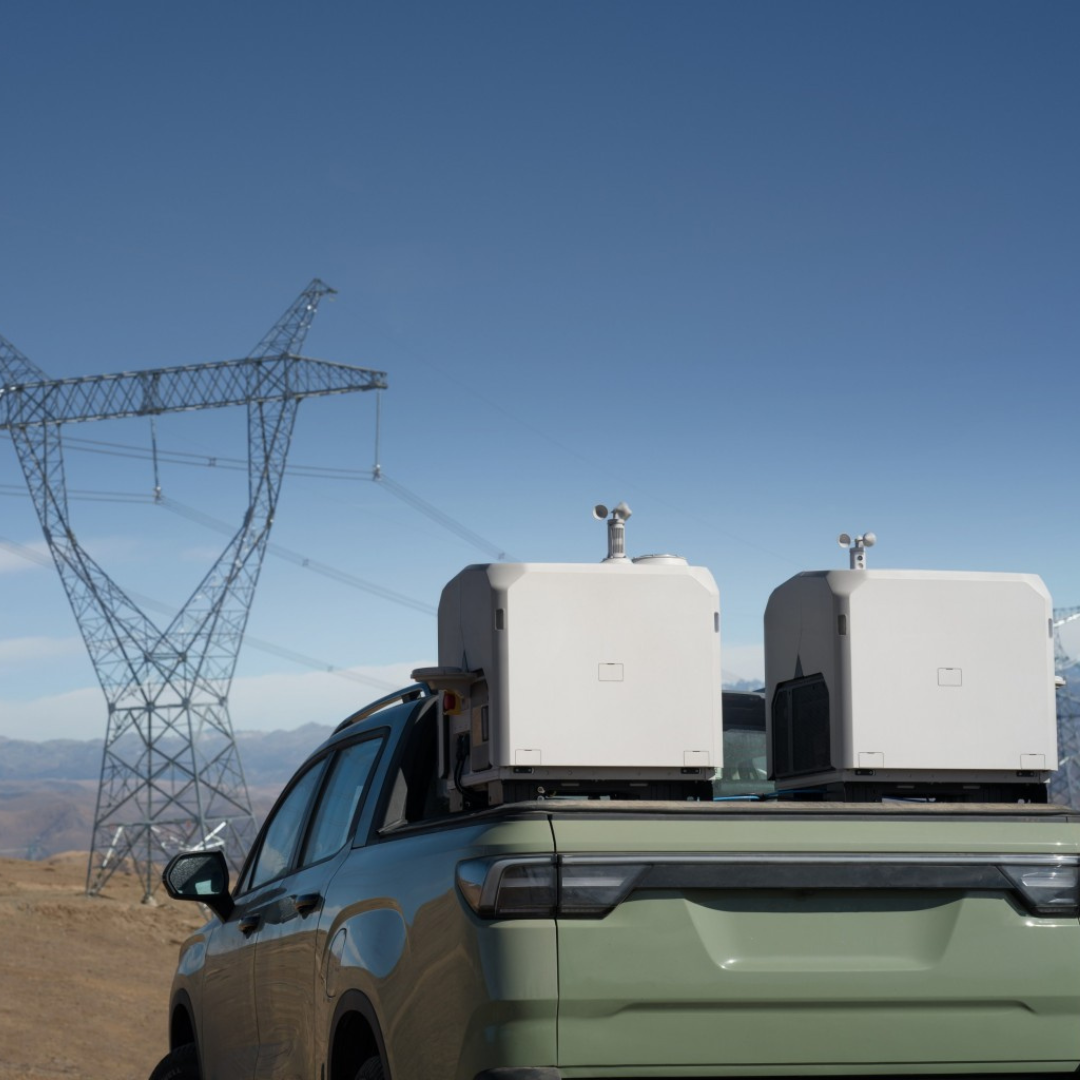
And the real headline is that the M4TD can be used as a standalone option - independently of the Dock - and, crucially, is IP-rated, just like the M30T.
In this blog, we compare the M30T, M4T, and M4TD, to help you decide which portable drone is best for your thermal applications.
Key specs at a glance
Performance
Spec | Matrice 4TD | Matrice 4T | Matric 30T |
|---|---|---|---|
IP Rating | IP55 | Unrated | IP55 |
Max Flight Time | 54 minutes | 49 minutes (standard propeller) - 46 minutes (silent propeller) | 41 minutes |
Transmission Capability | 04 transmission (25km max) | 04 transmission (25km max) | 04 transmission (25km max) |
Max Payload | 240g | 200g | 300g |
Max Wind Resistance | 12 m/s | 12 m/s (during operation and takeoff + landing) | 12 m/s |
Operating Temperature | -20° to 50° C (-4° to 122° F) | Not available | -20° to 50° C (-4° to 122° F) |
Charging Speed (0 to 100%) | 50 minutes | 76 minutes | 50 minutes |
Battery Cycle Count | 400 charges | 200 charges | 400 charges |
Design
Spec | Matrice 4TD | Matrice 4T | Matrice 30T |
|---|---|---|---|
Foldable Arms | No | Yes | Yes |
Diagonal Wheelbase | 498.5mm | 438.8mm | 688mm |
Weight (with battery) | 1850g | 1219g | 3770g |
Wide-angle Camera
Spec | DJI Matrice 4TD | DJI Matrice 4T | Matrice 30T |
|---|---|---|---|
Image Sensor | 1/1.3-inch CMOS, Effective Pixels: 48 MP | 1/1.3-inch CMOS, Effective Pixels: 48 MP | 1/2-inch CMOS, Effective Pixels: 48 MP |
Lens | FOV: 82° Equivalent Focal Length: 24 mm Aperture: f/1.7 Focus: 1 m to ∞ | FOV: 82° Equivalent Focal Length: 24 mm Aperture: f/1.7 Focus: 1 m to ∞ | FOV: 84° Focal Length: 4.5 mm (Equivalent Focal Length: 24 mm) Aperture: f/2.6 Focus: 1 m to ∞ |
Night-scene Mode | Full-Color Night Scene | Full-Color Night Scene | Not available |
ISO Range | 100-25600 Night Scene Mode: 100-409600 | 100-25600 Night Scene Mode: 100-409600 | 100-25600 |
Shutter Speed | Electronic Shutter: 2-1/8000 s | Electronic Shutter: 2-1/8000 s | Auto Mode: Photo: 1/2-1/8000 s Video: 1/30-1/8000 s M Mode: Photo: 8-1/8000 s Video: 1/30-1/8000 s |
Medium Tele Camera
Spec | DJI Matrice 4TD | DJI Matrice 4T | DJI Matrice 30T |
|---|---|---|---|
Image Sensor | 1/1.3-inch CMOS, Effective Pixels: 48 MP | 1/1.3-inch CMOS, Effective Pixels: 48 MP | Not available |
Lens | FOV: 35° Equivalent Focal Length: 70 mm Aperture: f/2.8 Focus: 3 m to ∞ | FOV: 35° Equivalent Focal Length: 70 mm Aperture: f/2.8 Focus: 3 m to ∞ | Not available |
Night Scene Mode | Full colour | Full colour | Not available |
ISO Range | 100-25600 Night Scene Mode: 100-409600 | 100-25600 Night Scene Mode: 100-409600 | Not available |
Shutter Speed | Electronic Shutter: 2-1/8000 s | Electronic Shutter: 2-1/8000 s | Not available |
Tele Camera
Spec | DJI Matrice 4TD | DJI Matrice 4T | Matrice 30T |
|---|---|---|---|
Image Sensor | 1/1.5-inch CMOS, Effective Pixels: 48 MP | 1/1.5-inch CMOS, Effective Pixels: 48 MP | 1/2-inch CMOS, Effective Pixels: 48 MP |
Lens | FOV: 15° Equivalent Focal Length: 168 mm Aperture: f/2.8 Focus: 3 m to ∞ | FOV: 15° Equivalent Focal Length: 168 mm Aperture: f/2.8 Focus: 3 m to ∞ | Focal Length: 21-75mm (Equivalent Focal Length: 113- 405 mm) Aperture: f/2.8 - f/4.2 Focus: 5 m to ∞ |
Night Scene Mode | Full-Color Night Scene Black-and-White Night Scene | Full-Color Night Scene Black-and-White Night Scene | Not available |
ISO Range | 100-25600 Night Scene Mode: 100-819200 | 100-25600 Night Scene Mode: 100-819200 | 100-25600 |
Shutter Speed | Electronic Shutter: 2-1/8000 s | Electronic Shutter: 2-1/8000 s | Auto Mode: Photo: 1/2-1/8000 s Video: 1/30-1/8000 s M Mode: Photo: 8-1/8000 s Video: 1/30-1/8000 s |
Infrared Thermal Camera
Spec | DJI Matrice 4TD | DJI Matrice 4T | DJI Matrice 30T |
|---|---|---|---|
Lens | DFOV: 45°; Equivalent focal length: equivalent: 53 mm; Aperture: f/1.0; Focus: 5 m to ∞ | DFOV: 45° Equivalent Focal Length: 53 mm Aperture: f/1.0 Focus: 5 m to ∞ | DFOV :61° Focal Length: 9.1mm (Equivalent focal length: 40 mm) Aperture: f/1.0 Focus: 5 m to ∞ |
Temperature Measurement Range | -20℃ to 150℃ (High Gain), 0℃ to 550℃ (Low Gain) | High Gain Mode: -20° to 150° C (-4° to 302° F) Low Gain Mode: 0° to 550° C (32° to 1022° F) | High Gain Mode: -20° to 150° C (-4°to 302° F) Low Gain Mode: 0° to 500° C (32°to 932°F) |
Video Resolution | 1280×1024@30fps (Super Resolution enabled, Night Mode not activated) 640×512@30fps | 1280×1024@30fps (UHR Infrared Image function enabled, Night Scene mode not enabled) 640×512@30fps | UHR Infrared Image Mode: 1280×1024 Normal Mode: 640×512 |
Digital Zoom | 28× | 28× | Not available |
Accessories + Features
Spec | DJI Matrice 4TD | DJI Matrice 4T | Matrice 30T |
|---|---|---|---|
DJI Speaker | Available | Available | Not available |
DJI Spotlight | Available | Available | Not available |
Smart People - Vehicle Boat - Detection | Supported | Supported | Not supported |
Smart Track | Supported | Supported | Supported |
Laser Range Finder | Supported | Supported | Supported |
How does the Matrice 4TD compare to the Matrice 4T series?
So, how does the M4TD compare to the M4T?
After all, they are essentially the same aircraft.
But there are some key differences.
Firstly, the IP rating.
The Matrice 4T is an impressive platform, but the lack of an official weatherproofing was seen, by some, as a stumbling block, potentially for applications such as public safety.
In this respect, the M4TD ticks the box - protected with an IP55 rating, just like the M30T.
On the other side of the coin, the M4T has foldable arms, whereas the M4TD does not.
In terms of camera payload, both share a tri-camera system which includes wide-angle, medium and telephoto options making both solid options for imaging tasks and inspections.
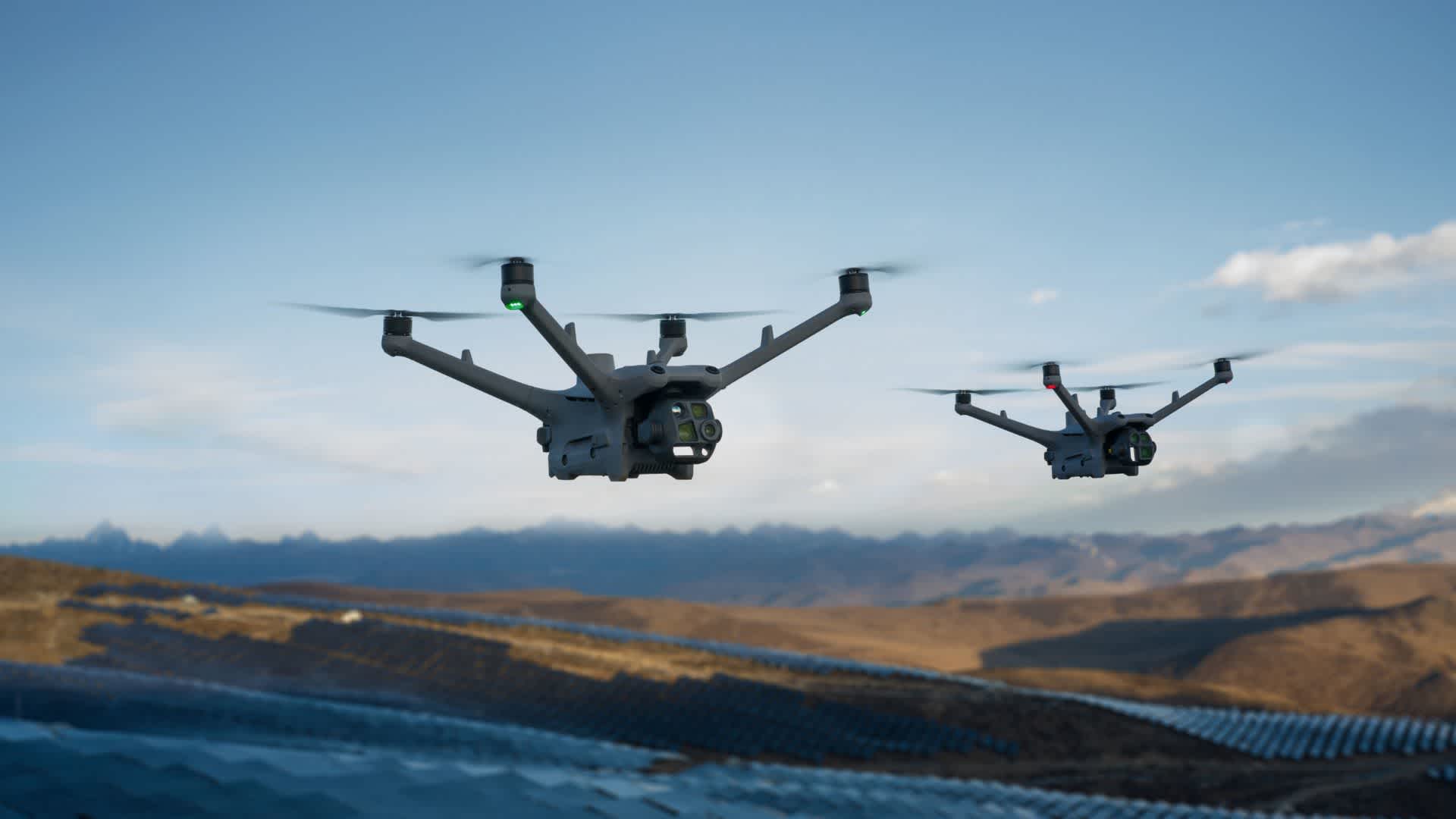
From a technical perspective, the 4TD also supports airborne relay which is a gamechanger in tough terrain such as mountains, with one drone flying higher in order to boost the signal of the other.
How does the Matrice 4TD compare with the Matrice 30T?
Both these IP55-rated drones are versatile and powerful and capable of reaching a full charge in less time than it takes to watch an episode of Game of Thrones.
One notable difference though is size; the Matrice 30T is twice as heavy, which does give it more oomph when it comes to carrying payloads.
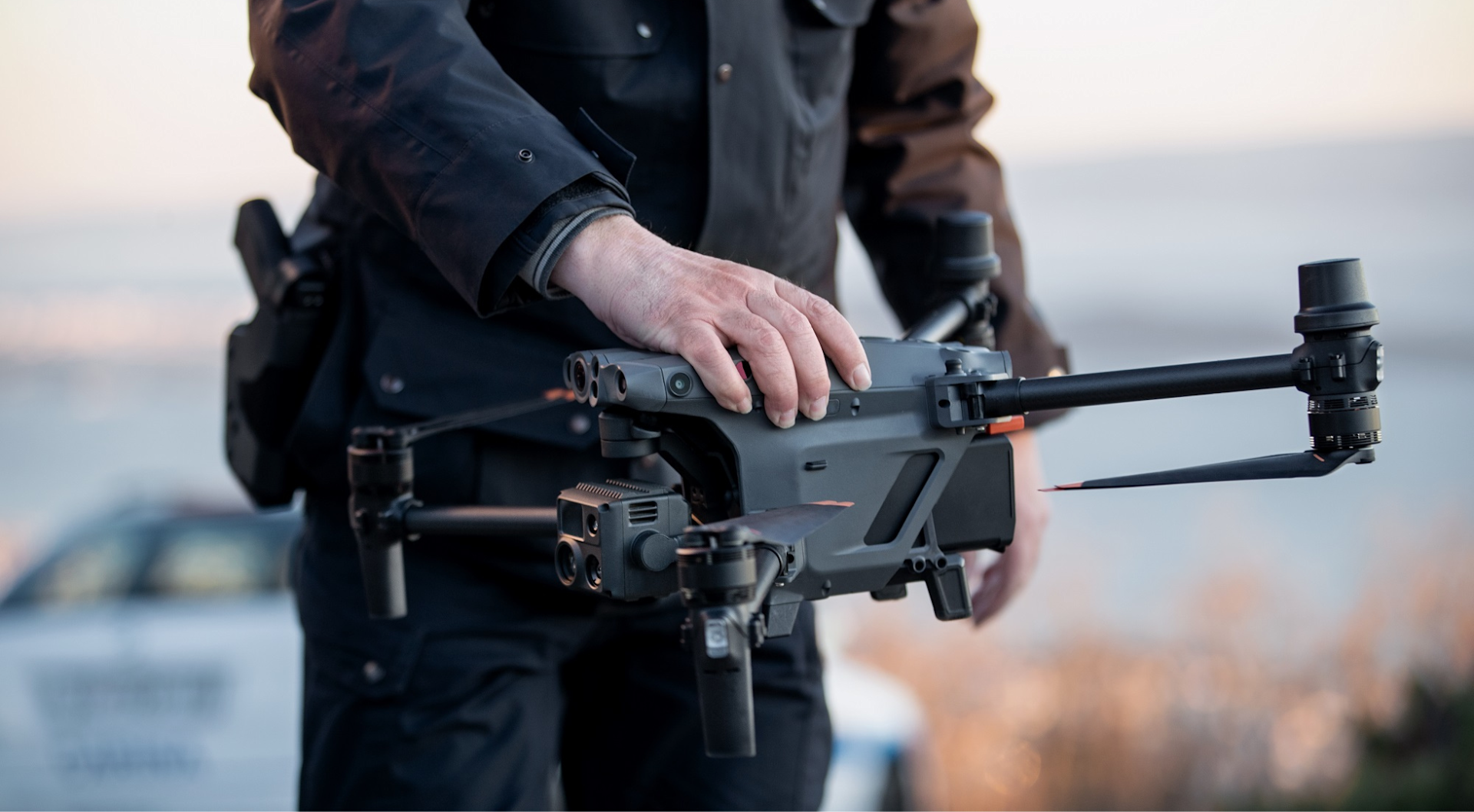
However, from a technical perspective, the Matrice 4TD holds a lot of the aces.
For one, flight time; the Matrice 4TD can stay in the air an impressive 13 minutes longer.
On top of this, many of the Matrice 4TD's cool features - such as the full-colour night mode and the NIR Auxiliary light, which are both really beneficial for first responders - are missing from the M30T, while the former has on-board relay capability, which again could prove highly beneficial during something like a rescue mission.
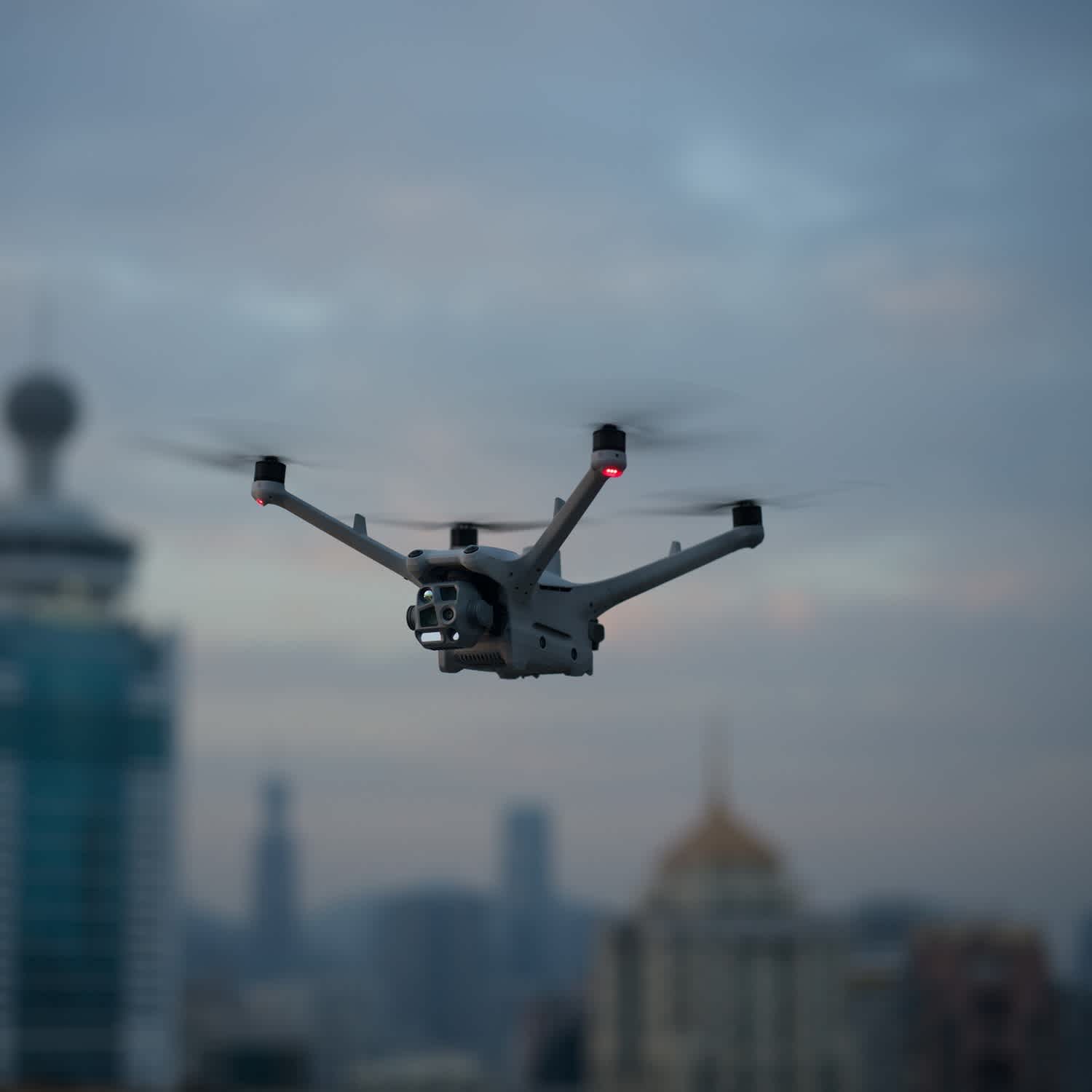
Additionally, the Matrice 4TD's laser range finder is effective for up to 1,800m - a full 50 per cent longer than the 30T's 1,200m range - while unlike the M30T, it can be equipped with DJI's speaker and spotlight (although the M30T is compatible with the GL60 spotlight and LP12 searchlight and speaker).
And while the ever-robust M30T is still an exceptional piece of kit, the Matrice 4TD's superior imaging capabilities and longer endurance give it the clear advantage.
Summary
While all three drones remain at the forefront of the industry, the new Matrice 4TD marks yet a further evolution in DJI's enterprise series.
While the M4T is the budget-friendly alternative (and works wonders for those seeking a more portable option given it is foldable), the IP-rated M4TD will fly longer, charge quicker and is notably lighter - making it the ideal first option for most drone operators.
The M4TD is essentially the perfect blend of the two other drones in this comparison: Merging the upgraded specs of the M4T with the weather-protection of the M30T.
All three drones are available at heliguy™, and our expert in-house team of specialists will happily advise you on which model is best for your needs. To view the full DJI Enterprise range, click here, or contact us.
